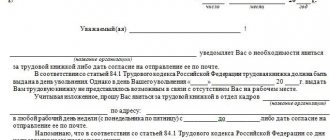Where to go in case of illegal dismissal?
If you were illegally fired, you can contact the Labor Inspectorate, the Prosecutor's Office or the Court. Appealing to the Labor Inspectorate or the Prosecutor's Office is possible either independently or by using the services of a labor law lawyer. The complaint must state all the facts of violation of your rights by the employer, indicate your last name, first name and patronymic, as well as all your contact information, the full name of the organization where you work and its location. As a rule, an indication of the violated rules of law and references to the law are not required. Employees of these departments are themselves competent lawyers in labor disputes. However, you need to understand that an appeal to the Prosecutor's Office or the Labor Inspectorate can only be effective in cases where the employer's guilt does not need to be proven, i.e. the dismissal is clearly illegal. Otherwise, if employers put forward their version of events, reinstatement at work is possible only through the Court.
Labour Inspectorate
is obliged to accept your complaint against the employer and carry out an inspection of the company for violations of labor laws not only in relation to you, but also in relation to the entire company as a whole. As a rule, the labor inspectorate issues an order to eliminate violations of labor legislation and imposes a fine on both the organization and specific officials.
Prosecutor's office
, upon receiving a complaint from an employee, as a rule, forwards it to the labor inspectorate. The prosecutor's office, as a rule, deals only with labor disputes related to mass non-payment of wages, mass illegal dismissals, as well as cases falling under the Criminal Code.
Court
is the only body that has the full right to reinstate a person to work. Its decisions are binding on all citizens and organizations and are executed unconditionally. It should be remembered that
In case of disputes about dismissal, the period for filing a claim with the court is one month.
Letter of resignation
A resignation letter of one's own free will is an expression of the will of the employee alone, which the employer is obliged to accept. In this case, the employee has the right to change his mind or agree on something else (Article 80 of the Labor Code of the Russian Federation)
Since the employer loses someone who performed certain duties, the employee cannot leave immediately: he must work for 14 days while the employer looks for a replacement. If there is no problem with finding a new employee, the employer has the right to let the previous employee go earlier - if he is satisfied with the shortened working hours.
But, until 14 days have expired or an earlier date for termination of the employment contract has been set, the employee has the right to withdraw his application and continue to work. Or do not withdraw the application, but on the 15th day, with the consent of the employer, go back to work.
There is an exceptional case when it is impossible to withdraw a resignation letter: when a written offer to take this position is sent to another person. But I think this is rare.
Even if an employee is forced to write a resignation letter of his own free will, the law gives the employee two weeks to change his mind and notify the employer. First of all, you need to write a letter to the employer, and not to the labor inspectorate or prosecutor's office.
When is dismissal considered illegal?
1. Lack of grounds for dismissal.
According to Art. 77 of the Labor Code of the Russian Federation establishes general grounds for termination of an employment contract; there cannot be other grounds not provided for by the Labor Code or other Federal Law.
That is, any dismissal for reasons not provided for by the Labor Code or other law is illegal.
In addition to the fact that the dismissal of an employee must be carried out on the grounds listed in the Labor Code, the employer is obliged to prove in court that such grounds really existed and were not artificially created by him. For example, if an employee was dismissed due to an unsatisfactory test result (Article 71 of the Labor Code of the Russian Federation - Test result upon hiring), that is, as having not passed the probationary period, then in a labor dispute trial the employer will be obliged to prove to the court and the prosecutor that the competence the employee really does not correspond to his position, that he did not complete the tasks provided for in the test plan. The employer is obliged to confirm these facts by presenting written evidence to the court and the prosecutor's office.
The court may also take into account how much the punishment in the form of dismissal corresponds to the severity of a particular disciplinary offense, even if such an offense is punishable by dismissal.
2. Violation of the dismissal procedure, as a basis for declaring dismissal illegal.
The order (procedure) of dismissal is a sequence of actions carried out by the employer in order to terminate the employment relationship with the employee. This procedure is provided for by the Labor Code and other Federal laws.
Significant violations of the employee dismissal procedure include:
- provided for in Art. 192 -193 of the Labor Code of the Russian Federation, violation of the procedure for bringing to disciplinary liability, in cases where dismissal is considered as a type of disciplinary liability;
- if the employer has not offered the employee all available similar or lower-level vacant positions suitable for the employee for health reasons (Part 3 of Article 81 of the Labor Code of the Russian Federation);
- if the employer did not take into account the opinion of the trade union in certain cases of dismissal of its members (Part 2 of Article 82 of the Labor Code of the Russian Federation).
However, individual violations of the dismissal procedure may be regarded by the court as insignificant.
Also, illegal dismissal is recognized as the dismissal at the initiative of the employer of pregnant women, single mothers and fathers raising a child under fourteen years of age, except in the event of liquidation of the organization (Article 261 of the Labor Code of the Russian Federation), it is illegal to dismiss an employee at the initiative of the employer while he is in maternity or regular leave, or on sick leave (Article 81 of the Labor Code of the Russian Federation).
If an employer violates labor and labor protection legislation, he may be brought to administrative liability under Art. 5.27. Code of Administrative Offenses of the Russian Federation.
It should be borne in mind that in the event of illegal dismissal from work, it is necessary to take action as quickly as possible. According to the provisions of Article 392 of the Labor Code of the Russian Federation, the limitation period for labor disputes, i.e. The deadline for filing a claim for illegal dismissal is one calendar month from the day the dismissal order or work record book was issued; for other labor disputes, the general period for filing a claim is three months.
Protecting the rights of an employee upon dismissal is most effective if the interests of the injured party are represented by qualified lawyers. By contacting our office for help, you will receive competent legal advice and assistance to challenge unlawful dismissal in court, at the labor dispute commission, or at the prosecutor's office. Properly drafted claims to the court and to the employer help to quickly and effectively resolve labor disputes that have arisen.
If your labor rights are violated, do not neglect the services of professional lawyers. We will be able to establish and prove the illegality of the actions taken against you, and will help restore justice by competently representing your interests in court.
Specialists of the Moscow Legal Bureau help in resolving all types of labor disputes.
Illegal termination of an employment contract
Before dismissing an employee from an organization, the manager issues an order. The employee must read it and sign it. It is inappropriate to refuse to sign - in this case, an act is drawn up with the signatures of witnesses stating that the dismissed person was notified of the termination of the employment relationship with him.
If the employee believes that he was fired unlawfully, he should take a copy of this document. All the grounds on which an employee can be dismissed from an organization are spelled out in Articles 74−84 of the Labor Code of the Russian Federation.
In other cases, dismissal will be considered illegal. The most common situations in organizations are:
- the boss forced me to write a statement of my own free will;
- the manager violated the dismissal procedure;
- the employment relationship was severed with an employee who was on maternity leave, regular leave or sick leave;
- dismissal for misconduct with a minor disciplinary violation;
- refusal to pay due compensation;
- dismissal of a single mother who is raising a child under 14 years old;
- dismissal due to staff reduction without prior warning.
These are the most common cases, but they are not the only ones. Therefore, if an employee is sure that he was fired unlawfully, he can appeal such a decision.
How does reinstatement work?
Sometimes, even after winning a labor dispute in court, citizens still have questions about the reinstatement procedure itself, especially when the employer does not want to voluntarily reinstate the employee to his previous position.
According to the requirements of Art. 392 of the Labor Code of the Russian Federation, if an employee does not agree with the dismissal, he has the right to apply for reinstatement directly to the court.
The period within which an employee can go to court in order to be reinstated at work is one month from the date of receipt of the dismissal order or work record book; the state fee in disputes about dismissal is not paid (Articles 392, 393 of the Labor Code of the Russian Federation).
Trials for reinstatement at work take place in the district court at the place of registration of the employer and are carried out with the mandatory participation of a prosecutor. The period for consideration of this category of cases is one month, but in practice this requirement is not fulfilled by the courts.
Appealing dismissal due to redundancy
Reducing staff is a rather complicated procedure. If management has decided to hold such events, then it must be prepared to prepare a huge number of documents.
In addition, a special commission should be created, which is obliged to carefully study candidates for reduction. The following factors are taken into account for the study:
- length of service with this employer;
- level of qualifications and labor indicators;
- the presence or absence of benefits provided to certain categories of workers.
We invite you to familiarize yourself with: Sample general power of attorney from the company 2021 for all powers
After conducting the study, the entire selected team must be notified at least 2 months before the start of reduction measures. Important! The employee must be paid severance pay in the amount of two salaries.
If one of the conditions is violated, the employee can appeal his layoff. Like dismissal for any other reason, this method of terminating the employment relationship can be challenged through the supervisory authority. It is enough to write a complaint, and the legality of dismissal and measures to reduce staff or number of employees will be checked.
If the purpose of the complaint is specifically reinstatement at work, then it is recommended to file documents with the court. The powers of the labor inspectorate are not as broad as those of the court. Labor inspectors can issue a decision on reinstatement at work only when a violation of the employee’s rights is obvious, for example:
- the employer did not notify on time;
- there is no written evidence that the dismissed person was offered another vacancy;
- the employee did not receive severance pay in full;
- the employee belongs to the category of workers who cannot be laid off. For example, he laid off a pregnant employee.
In addition, the employer’s responsibilities include drawing up and approving a new staffing table.
What to do if you win the Court?
If the court finds the dismissal of an employee illegal, the employer is obliged to actually reinstate the illegally dismissed employee in his previous position. In addition, the employer pays the employee the average salary established by the court for the entire period of forced absence; this requirement is provided for in Art. 394 Labor Code of the Russian Federation. Such a decision comes into force immediately, in accordance with the requirements of Art. 396 of the Labor Code of the Russian Federation and Art. 211 Code of Civil Procedure of the Russian Federation.
If the employer delays the reinstatement of such an employee, then the court makes a decision on the payment of average earnings for the time when the employer delays the execution of the previous decision on reinstatement.
The Court's decision on reinstatement in case of illegal dismissal is considered executed if the dismissal order is canceled and the employee is allowed to return to his previous job (Article 106 of the Law on Enforcement Proceedings). Art. 105 of the Law on Enforcement Proceedings provides that the bailiff issues an order to the employer to collect an enforcement fee and sets a new deadline for the execution of the court decision on reinstatement at work if the employer does not comply with the court decision on the reinstatement of the illegally dismissed employee. However, if in this case the employer does not fulfill the requirements of the writ of execution within the new period, then a fine is imposed on him in accordance with the requirements of Art. 17.5 of the Code of Administrative Offenses of the Russian Federation and establishes a new period during which reinstatement to work must be carried out in court. If in this case the requirement is not fulfilled, the fine increases.
Differences between self-will and coercion
Forcing an employee to leave at his own request by the management of an enterprise must be distinguished from making an independent decision to resign due to certain reasons. Confusion in these concepts has more than once led to the reinstatement of a person who resigned in the absence of legal grounds.
So, if the management of the enterprise demanded from the employee a written explanation of the reasons for his disciplinary offense, and in response to this he submitted a letter of resignation, such an action should be considered as an independently made decision to terminate the contract, and not coercion. If, after resigning, the employee challenges the procedure, the court must objectively assess the circumstances.
If the management of the enterprise really puts pressure on the employee, for example, threatens to fire him “under the article”, which may negatively affect his business reputation, but he did not commit a disciplinary offense, such termination of the contract will be considered illegal. However, the citizen will need to file a complaint and prove the fact of coercion. To do this he can use:
- Documentation.
- Witness's testimonies. Other employees are not often willing to testify against the management of the enterprise where they will continue to work. However, in the case of mass illegal dismissals, this method of proof is extremely effective.
- Business correspondence.
- Audio and video recordings.
- Other evidence within the framework of current legislation.
According to the Code of Civil Procedure of the Russian Federation, all evidence must be obtained legally.








